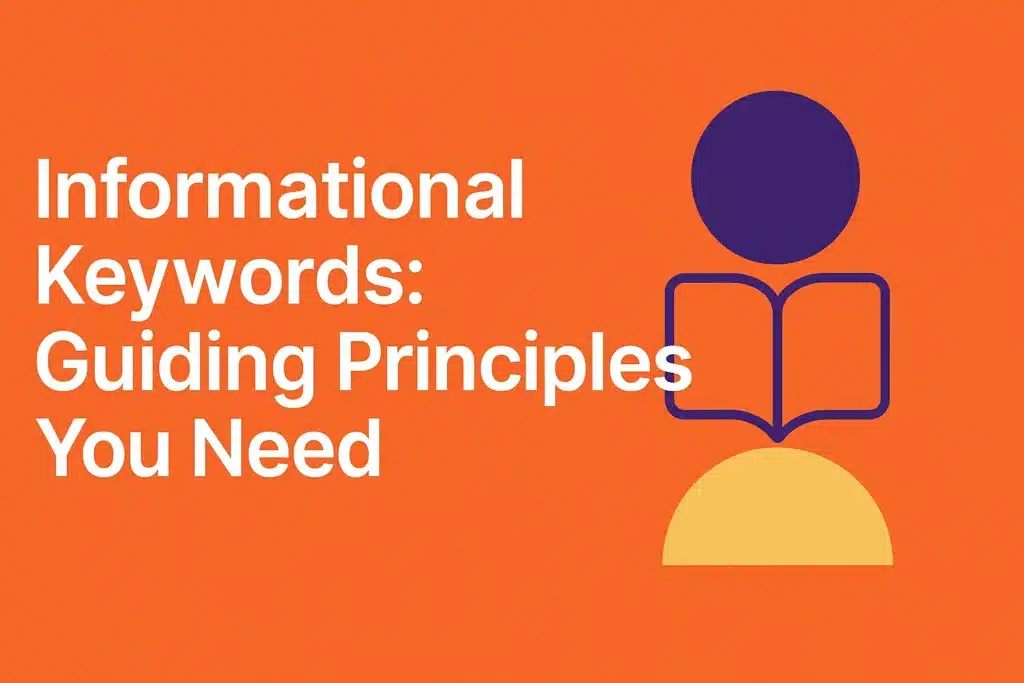Informational keywords help connect search users with the answers they want. Knowing these terms is simply important for anyone who aims to bring exposure to their content. By aligning topics with a user’s desire to learn, websites can attract people who are in the early stages of research and offer relevant details that guide them forward.
Understand the basics of informational keywords
Informational keywords guide users who want to learn more about a topic. They focus on questions as “why,” “how,” and “what,” highlighting a user’s research stage. By improving content for these queries, marketers effectively capture an audience that really values clear answers. These keywords form a foundation for building genuine trust because they offer valuable insights. They differ from keywords designed for direct transactions or brand-specific browsing. This approach shapes helpful resources that match search intent and show genuine expertise. Readers value clarity.
What are informational keywords and why they matter
Informational keywords often center on research-based questions that help people solve problems. They often directly involve “what,” “why,” and “how” phrasing. Research shows that about 80% of searches fall into this category (Moz). By addressing these queries, brands meet readers during their early exploration. This contact builds confidence because visitors really gain well detailed data before considering products or services. In turn, these searches create trust and open future options. Audiences value clarity.
How they differ from navigational and transactional keywords
Navigational keywords address users who already know which page they want. Transactional keywords draw those ready to buy. Informational keywords fill a specific gap by focusing on knowledge rather than direct action. Keyword intent reflects the reason behind an online query. Navigational queries help users locate a brand or page. Transactional queries include terms like “buy,” while informational ones answer questions that spark deeper research. Each serves different goals.
Common traits of high-performing informational keywords
High-performing informational keywords often draw large volumes of curious users. They tend to be long-tail, making them less tough. About 70% of searches are long-tail (Moz). They also feature question phrases, like “what” or “why,” which target specific needs. These keywords build trust because they address real problems. They fit well with awareness-stage content, showing genuine guidance. This approach brings ongoing traffic and potential leads. Readers return. Clarity sparks loyalty.
Spot and assess informational search intent effectively
Identifying informational intent involves studying how people phrase their queries. Keywords with “how,” “why,” or “what” suggest a research focus. Search Engine Results Pages often display knowledge boxes or featured snippets for these queries. Checking these elements shows a user’s desire for details. Marketers who understand this intent create content that covers key questions. They also track user engagement to verify relevance. By matching content to actual needs, businesses see engagement that build brand confidence. Clear answers connects. Trust grows.
How to find informational keywords based on search behavior
Looking at user queries is essential for finding informational keywords. Steps include checking search volumes for question-based terms and studying SERPs to see if they feature guides or meanings. Research shows that around 80% of queries are informational (AgencyAnalytics). Google Search Console reveals which phrases pull traffic. Marketers benefit by finding queries with words like “how to” or “what is,” then shaping content around genuine knowledge. Clarity drives user trust.
Informational search intent examples in popular industries
Industries like healthcare see users asking “what causes fever” or “how to treat back pain.” In finance, people question “what is compound interest” or “why does credit matter.” Customers often consult multiple sources (Neil Patel). In tech, terms like “how to update software” appear. Each example shows a user’s desire to learn. Addressing these queries attracts informed readers who may move to advanced research or future solutions. Clarity improves trust.
Best practices for mapping keywords to search intents
Matching keywords to the right intent requires grouping them by the user’s goal. Informational terms match guides or FAQs, while commercial signals fit product contrasts. Search Intent is the purpose behind a query (Backlinko). Review SERPs to confirm whether a keyword show articles or product pages. Craft content that addresses that found intent. Sections or anchor links help readers jump to the parts they find relevant. Accuracy matters.
Strategically include informational keywords in your SEO plan
An SEO plan that carefully includes informational keywords can attract searchers in the early stages of discovery. You can cluster relevant topics to build a logical structure. Good planning also arranges content to address different search intents within separate pages. Each page can highlight a key term, from answers to step-by-step instructions. By including these words, you present value without forcing sales messages. This approach highlights a commitment to guidance. You gain trust for providing substantial knowledge, while still leading users to additional resources when they’re ready for deeper engagement. Consistency grows audiences. Trust grows.
Build topical authority with smart keyword clustering
Keyword clustering groups related terms under one theme, making sure each piece of content covers a distinct angle. This tells search engines that you have thorough coverage of a topic. By grouping informational queries, you show in-depth knowledge. Each cluster can address keywords that share context. This method also helps users find what they need. Creating linked articles shows expertise and broadens the potential reach of your SEO efforts. Consistency matters.
Refine content using different types of search intent
Different intent types call for distinct content formats. Informational queries create how-to guides, while commercial ones need product overviews. Navigational queries point to brand-related pages, and transactional terms align with purchase pages. Search intent is the purpose behind each query (Backlinko). By organizing content by intent, you address specific needs. This strategy shows your site’s structure and keeps users engaged. Each section handles the questions they seek. Accuracy builds trust.
Evaluate keyword value with metrics that matter
Assess the potential of informational keywords by checking search volume and challenge. Search volume shows how often users enter a query. Challenge scores reveal competition levels. A higher score suggests that more websites fight for the same phrase. Click-through rate shows how appealing your listing seems, while cost-per-click indicates commercial value. Tracking these metrics helps smarter decisions. This helps you focus on terms that bring consistent traffic. Confidence grows.
Conclusion
Informational keywords form an SEO strategy that meets early-stage users who need guidance. By targeting these terms, you present reliable data that builds user trust. This trust can create opportunities for deeper engagement and potential conversions. Each step, from researching search intent to clustering related keywords, leads to content that aligns with what users want. This clarity keeps them interested, improving your standing and boosting search rankings. By mapping queries to appropriate pages and tracking metrics, you maintain an approach that reflects real needs. Over time, assisting with informative answers supports stronger brand awareness and develops loyal bonds. Each response improves user satisfaction. Steadiness brings benefits.
FAQs
Here are common questions covering informational keywords. These FAQs address concerns about tools, SEO impact, and varied search intents. Each answer helps clarify how to optimize content for users who seek knowledge, ensuring clarity in your SEO strategy. Explore them.
What are the best tools to find informational keywords?
How do informational keywords affect SEO rankings?
Can one keyword have different types of search intent?
How important is search intent in keyword research?
How to write content that answers informational search intent effectively?
Are informational search intent examples the same across all industries?

Ridam Khare is an SEO strategist with 7+ years of experience specializing in AI-driven content creation. He helps businesses scale high-quality blogs that rank, engage, and convert.



